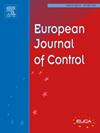离散时间系统输出调节的事件触发控制
IF 2.6
3区 计算机科学
Q2 AUTOMATION & CONTROL SYSTEMS
引用次数: 0
摘要
本文主要研究离散线性系统的事件触发控制机制设计,以实现输出调节。它考虑了一个基于观测器的状态反馈控制器,并提出了设计一个事件触发机制的条件,该机制在瞬态响应期间保持精确的调节,同时减少控制更新。由于周期引用的事件触发策略在稳定状态下退化为时间触发策略,即在每个时间瞬间都产生事件,因此提出了一种宽松的触发准则。这种机制产生了具有可接受误差范围的实际输出规则。针对精确情况和实际情况,导出了以线性矩阵不等式形式设计保证闭环稳定性的触发机构参数的条件。因此,提出了优化问题来调整这些参数,以平衡控制更新的减少和稳态输出调节误差的容忍度。给出了一个数值算例来说明该方法。本文章由计算机程序翻译,如有差异,请以英文原文为准。
Event-triggered control for output regulation of discrete-time systems
This paper focuses on the design of event-triggered control mechanisms to achieve output regulation for discrete-time linear systems. It considers an observer-based state feedback controller and proposes conditions to design an event-triggered mechanism that maintains exact regulation while reducing control updates during the transient response. Since for periodic references the event-triggered policy degenerates into a time-triggered policy in steady state, that is, events are generated at each time instant, a relaxed triggering criterion is proposed. This mechanism leads to a practical output regulation with an acceptable error bound. For both the exact and practical cases, conditions in the form of linear matrix inequalities are derived to design the trigger mechanism parameters guaranteeing the closed-loop stability. Optimization problems are therefore proposed to tune these parameters to balance the control updating reduction and the tolerance for output regulation errors in steady state. A numerical example is provided to illustrate the methodology.
求助全文
通过发布文献求助,成功后即可免费获取论文全文。
去求助
来源期刊

European Journal of Control
工程技术-自动化与控制系统
CiteScore
5.80
自引率
5.90%
发文量
131
审稿时长
1 months
期刊介绍:
The European Control Association (EUCA) has among its objectives to promote the development of the discipline. Apart from the European Control Conferences, the European Journal of Control is the Association''s main channel for the dissemination of important contributions in the field.
The aim of the Journal is to publish high quality papers on the theory and practice of control and systems engineering.
The scope of the Journal will be wide and cover all aspects of the discipline including methodologies, techniques and applications.
Research in control and systems engineering is necessary to develop new concepts and tools which enhance our understanding and improve our ability to design and implement high performance control systems. Submitted papers should stress the practical motivations and relevance of their results.
The design and implementation of a successful control system requires the use of a range of techniques:
Modelling
Robustness Analysis
Identification
Optimization
Control Law Design
Numerical analysis
Fault Detection, and so on.
 求助内容:
求助内容: 应助结果提醒方式:
应助结果提醒方式:


